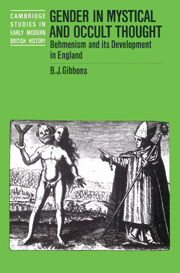Book contents
- Frontmatter
- Contents
- Acknowledgements
- 1 Introduction
- 2 Gender, sexuality and power in early modern England
- 3 Gender in mystical and occult thought
- 4 Gender in the works of Jacob Boehme
- 5 The reception of Behmenism in England
- 6 Behmenism and the Interregnum spiritualists
- 7 The female embassy
- 8 Conservative Behmenism
- 9 Wider Behmenist influences in the eighteenth century
- 10 Conclusion
- Bibliography
- Index
- Cambridge Studies in Early Modern British History
4 - Gender in the works of Jacob Boehme
Published online by Cambridge University Press: 03 November 2009
- Frontmatter
- Contents
- Acknowledgements
- 1 Introduction
- 2 Gender, sexuality and power in early modern England
- 3 Gender in mystical and occult thought
- 4 Gender in the works of Jacob Boehme
- 5 The reception of Behmenism in England
- 6 Behmenism and the Interregnum spiritualists
- 7 The female embassy
- 8 Conservative Behmenism
- 9 Wider Behmenist influences in the eighteenth century
- 10 Conclusion
- Bibliography
- Index
- Cambridge Studies in Early Modern British History
Summary
Boehme belongs to the spiritualist tradition in German Reformation thought, represented by such figures as Caspar Schwenckfeld, Sebastian Franck and Valentin Weigel. Above all, this tradition bequeathed him a sense of the immanence of God, and an understanding of redemption as a turning inwards towards God through the renunciation of self-will. Had Boehme confined himself to this emphasis on spiritual religion, tinged with Hermeticism and Cabala, there would be little to distinguish him from countless other spiritualists of the period. Boehme's spiritualism, however, was constructed within the framework of a distinctive metaphysics. Since his thought on gender is inextricable from this metaphysics, a brief exposition of his philosophy of God and nature is a necessary preliminary to this more specialised study.
For Boehme, there is no creation ex nihilo, since ‘where nothing is, there nothing can come to be’. Everything derives from a totally transcendent godhead, which Boehme calls the Abyss (Ungrund). This is a ‘Liberty without source or Quality’, ‘a stillness without substance’. The Abyss is a ‘nothing’ which, in order to become manifest, ‘bringeth it selfe into a will’. This will, corresponding to the Father in the Trinity, is itself incomplete, since all manifestation requires contrariety. It therefore calls forth an opposing principle, the desire, corresponding to the Son. These are Boehme's first two Principles, those of the fire-world and the light-world, ‘God's wrath-spirit’ and ‘a Meek love source’. Boehme insists that these Principles are ‘not parted asunder’ since ‘the Light dwelleth in the Fire’. The interrelationship between these two produces a third Principle, corresponding to the Holy Spirit, in which the godhead becomes complete.
- Type
- Chapter
- Information
- Gender in Mystical and Occult ThoughtBehmenism and its Development in England, pp. 89 - 102Publisher: Cambridge University PressPrint publication year: 1996



